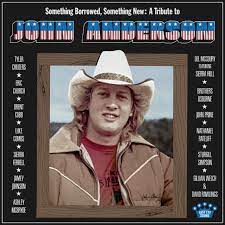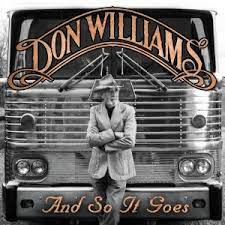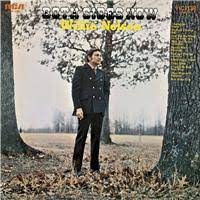Tutorial Pricing: $3.25ea OR any 10 for $10
(use code "Any10410" at checkout)
Paid Requests for $25ea
(comes with any 8 freebies -> so 9 for $25)
100's Of Free Demos & Chord Sheets
Marty Robbins Songs
On The Acoustic
Welcome to my Marty Robbins page where you'll find songs from Marty Robbins you can easily learn on the acoustic guitar.

You'll find free demos, sample videos, chord sheets, rhythm tips and more. If you require a full instructional video tutorial you can get one for a small fee. Discount pricing listed above.
Jump menu to quickly access the artists on this page.
Marty Robbins Songs
Chords, Samples, Demos, Tutorials
1. 20th Century Drifter
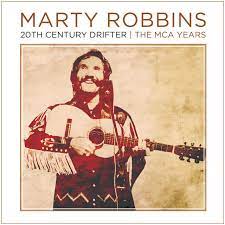
Twentieth Century Drifter was a top 10 hit for Marty Robbins in 1974 on the Billboard country singles chart.. It was written by Larry Gatlin and was a top 10 hit
The song is a tribute to Robbins himself, who was known as a "twentieth-century drifter" due to his restless spirit and constant touring. The lyrics describe the life of a traveling musician, always on the road and never staying in one place for too long.
The song's upbeat melody and catchy chorus make it a memorable tribute to Robbins' legacy as a country music legend
- Drop D Tuning: No
- Capo: 2nd fret is original key
- Rhythm: root down up down up down up root down up down up down up and repeat
- Picking: Yes
- Chords: D, Bm, Em, A7, E7, Gb, G
Jump To Top
2. Big Iron
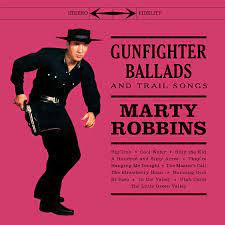
Big Iron is a classic Western ballad written and recorded by American singer-songwriter Marty Robbins. It was released in 1959 as a single and later included on his album "Gunfighter Ballads and Trail Songs." The song tells the story of a legendary Arizona Ranger who goes by the name of "Texas Red."
The song's narrative is told from the perspective of an unnamed narrator, who describes Texas Red as a feared outlaw who has committed numerous crimes. The Arizona Ranger sets out to capture him, and the two men engage in a gunfight in the town of Agua Fria, Arizona. The Ranger emerges victorious, and the townspeople praise him for his bravery.
"Big Iron" became one of Marty Robbins' most popular songs and is considered a classic of the Western music genre. Its memorable melody and vivid storytelling have made it a fan favorite, and it has been covered by many other artists over the years. The song's chorus, which repeats the phrase "Big Iron on his hip," has become an iconic part of Western folklore.
The song peaked at #5 in the US.
- Drop D Tuning: No
- Capo: No
- Rhythm: root down up down up down up and repeat
- Picking: Yes
- Chords: Dbm, Ab7, E, A, E6
Jump To Top Of Marty Robbins Songs
3. Devil Woman

Devil Woman was another great tune written and recorded by Marty Robbins. It was released as a single from his album "Devil Woman," which was released in 1962. ." The song tells the story of a man who becomes infatuated with a mysterious woman with a dark past.
The song's narrative is told from the perspective of the man, who warns others to stay away from the woman. He describes her as a "devil woman" who has a hold on him despite his better judgment. He knows that she is trouble, but he cannot resist her charms.
"Devil Woman" became one of Marty Robbins' biggest hits, reaching number one on the Billboard Hot Country Singles chart. Its memorable melody and haunting lyrics have made it a fan favorite, and it has been covered by many other artists over the years. The song's chorus, which repeats the phrase "Devil woman, let go of me," has become an iconic part of Robbins' legacy as a country music legend.
The song was also a top 5 in the UK and Australia.
- Drop D Tuning: Yes
- Capo: 2nd fret
- Rhythm: root down up root up down up and repeat
- Picking: Yes
- Chords: D, A7, G
Jump To Top
4. Don't Worry
Don't Worry ... info soon
- Drop D Tuning = Yes
- Capo = 2nd Fret
- Rhythm = down up down up with walking bass
- Picking = Yes
- Chords = D, G, A
Jump To Top
5. El Paso
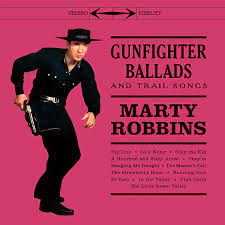
El Paso is a classic country and western song written and recorded by American singer-songwriter Marty Robbins. It was released in 1959 as a single and later included on his album "Gunfighter Ballads and Trail Songs." The song tells the story of a cowboy who falls in love with a Mexican dancer named Felina in the town of El Paso, Texas.
The song's narrative is told from the perspective of the cowboy, who describes his love for Felina and his actions to defend her honor after she is insulted by another man. The story takes a tragic turn when the cowboy kills the man in a fit of jealousy, and he becomes a fugitive from the law. The song ends with the cowboy returning to El Paso to be with Felina, where he is shot and killed by a posse.
"El Paso" became one of Marty Robbins' biggest hits and is considered a classic of the Western music genre. It won the Grammy Award for Best Country & Western Recording in 1961 and has been covered by numerous other artists over the years.
Jump To Top Of Marty Robbins Songs
6. Love Me
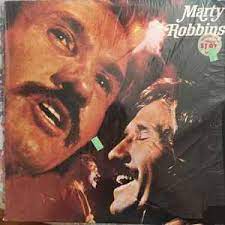
Love Me is a classic country and western song written by Jeanne Pruett and recorded by Marty Robbins in 1973. The song features Robbins' smooth vocals and a gentle melody that captures the song's tender lyrics about a man pleading for the love of a woman.
The song was one of four singles released from Marty Robbins' 1973 self-titled album.
The song reached No. 9 on the US Country charts and No. 3 on the Canadian charts, making it one of the most successful singles from the album.
Jump To Top
7. Singing The Blues
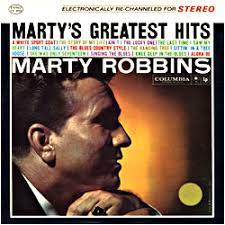
Singing The Blues was released by Marty Robbins in 1956 and was one of his earliest hits and helped to establish him as a major figure in the country and western music scene. The song was written by Melvin Endsley and had previously been recorded by other artists, but Robbins' version became the most popular.
Robbins' version of the song features a lively rockabilly rhythm and his signature smooth vocals, which give the song a unique and memorable sound. "Singing the Blues" topped the country charts and also became a hit on the pop charts, reaching No. 17.
The success of "Singing the Blues" helped to launch Marty Robbins' career and set the stage for a string of hit songs in the coming years. The song remains a beloved classic of the country and western genre and has been covered by many other artists over the years.
The track was released in 1956 from his Marty's Greatest Hits album.
- Drop D Tuning: Yes
- Capo: 2nd fret
- Rhythm: root down up root up down up
- Picking: Yes
- Chords: A7, D, G, Ab, A, D7
Jump To Top Of Marty Robbins Songs
8. Streets Of Laredo

Streets of Laredo is one of his most iconic and enduring songs. The song is a traditional Western ballad that tells the story of a dying cowboy who reflects on his life and experiences.
Robbins' version of the song features his signature smooth vocals, accompanied by acoustic guitar and a gentle, melancholy melody. The song's haunting lyrics and evocative melody have made it a favorite of country and western fans for generations.
"Streets of Laredo" was released on Marty Robbins' 1965 album "More Gunfighter Ballads and Trail Songs." The album was a follow-up to Robbins' highly successful 1959 album "Gunfighter Ballads and Trail Songs," which also featured a number of classic Western ballads and helped to establish Robbins as a major force in the country and western music scene.
Over the years this number has been covered by many other artists and has become a staple of the country and western music canon. The song's enduring popularity is a testament to the timeless appeal of traditional Western ballads and to the unique talents of Marty Robbins as a singer and storyteller.
Jump To Top
9. You Gave Me A Mountain
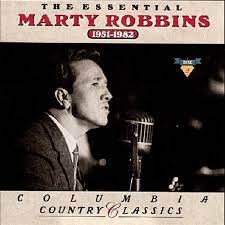
You Gave Me a Mountain is a powerful and emotional ballad that has become one of Marty Robbin's most beloved songs. The song was written by Marty in 1969 and it tells the story of a man who has faced many challenges in his life but finds strength and resilience through his faith and love.
Robbins' version of the song features his signature smooth vocals, backed by a simple yet effective arrangement that builds in intensity as the song progresses. The lyrics of the song are deeply personal and introspective, reflecting the struggles and triumphs of the human spirit.
"You Gave Me a Mountain" was released as a single in 1971 and became a hit on both the country and pop charts. The song has been covered by many other artists over the years, including Elvis Presley, who recorded a version of the song in 1973 that also became a hit.
This track is included on the compilation CD set "The Essential Marty Robbins 1951-1982", which was released in 1991. This CD set includes a selection of Robbins' most popular songs from throughout his career, and it is considered to be an excellent introduction to his music.
Jump To Top Of Marty Robbins Songs
Thank you for visiting this Marty Robbins songs page and I hope you found some useful and helpful info here.
If you liked this Marty Robbins page, you might also like ... (click images)
Very Easy Country Guitar Songs
